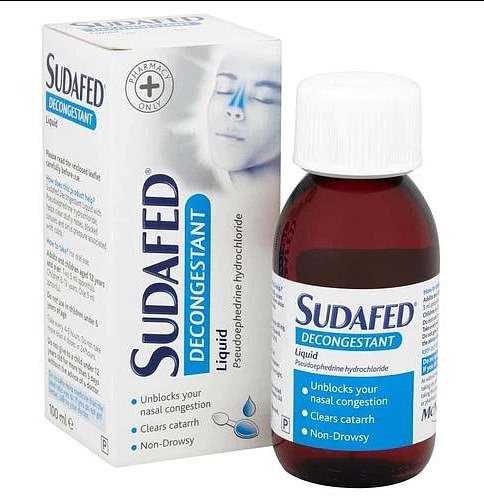Medics have warned of rising numbers of people becoming hooked on nasal decongestant sprays, which sometimes results in disturbing facial disfigurements.
The sprays, available for less than £4 at high-street chemists and supermarkets, are a go-to remedy for relieving a blocked nose.
But using them for longer than a week at a time can irritate sensitive blood vessels in the nose, causing swelling.
This makes congestion worse, resulting in a vicious cycle that leaves patients even more reliant on the medication to help them breathe.
Some patients are forced to have surgery to address damage caused by chronic swelling, which can lead to unsightly scarring.
Now, those affected by the problem are calling for the medications, such as Sudafed, to be made available by prescription-only so GPs can limit the supply.
Professor Claire Hopkins, an ear nose and throat (ENT) surgeon and rhinologist and sinus specialist at OneWelbeck in London, said this is an issue she is seeing regularly.
‘It’s probably becoming more common, as people’s access to healthcare is becoming more restricted,’ she told ITV.

Patients are becoming increasingly addicted to nasal decongestant sprays with some left with noses that look like lifelong cocaine users, medics have warned. Pictured Curtis Arnold-Harmer one of those whose life has been changed by the over-the-counter medication
‘We know it’s very difficult for patients to be seen in primary care, or ear nose and throat clinics.
‘So I think they’re more likely to turn to over-the-counter remedies.’
One patient trapped in a cycle of what he calls ‘addiction’ is Curtis Arnold-Harmer from Hastings.
He recently told ITV that at the height of his 18 months dependency on Sudafed he was using the spray every hour of the day.
‘If I didn’t take the spray I couldn’t breathe. It was as simple as that,’ he said.
In a TikTok clip which has been viewed nearly 2 million times, Mr Arnold-Harmer added that when medics examined his nose, the damage was so severe they assumed he had a cocaine addiction.
In the end he had to have an operation called a turbinate reduction, a procedure that reduces the size of internal structures in the nose called turbinates.
These structures had become inflamed and enlarged by using the decongestant sprays causing his ongoing blocked nose.
While the surgery has provided relief Mr Arnold-Harmer will have to have it every five to 10 years for the rest of his life.

Sudafed sprays for blocked noses cost around £4. But experts have warned of the dangers when using them for longer than advised
Mr Arnold-Harmer said he has been shocked by the numbers of social media users detailing similar situations.
‘I was ready for a few comments [on my video] calling me an idiot and saying, “you should have read the box”.
‘What I wasn’t ready for was tens of thousands of comments in the same situation as me.’
One wrote: I’m addicted to the Sudafed nasal spray, how do I stop this? I use it every morning, afternoon and night.’
Another added: ‘Exactly the same happened to me. I got pregnancy rhinitis and got addicted to Sudafed for two years!’
And another wrote: ‘It’s not just when I wake up anymore it’s every single day every hour…I’ve been doing this for six years.’
Hannah Brumpton, from Lincoln, is another patient to have needed surgery after developing a dependency on decongestant sprays.
She said it led to an almost unbearable level of discomfort.
‘It would feel so heavy within my face – not just my nose, but all underneath my eyes. They would feel all puffed up,’ she said.
‘The only way I could describe it is I either wanted to punch myself in the face, or pull my nose off my face.’
Georgia Hardacre, from Fleetwood, Lancashire is another patient to detail her dependency on decongestant sprays, which she has been using for decade.
‘It’s horrible,’ she said.
‘You just feel like you’re suffocated. I get really bad headaches if I don’t unblock myself.’
Mr Arnold-Harmer has launched a petition calling for MPs to take action and introduce restrictions on the sale of the medicine.
Prof Hopkins said the risk of severe damage — requiring surgery — from using the sprays for long periods was low.
Most patients are capable of weaning themselves off the drug and suffer no long-term nasal damage, she said.
Medics have also provided some tips for how to reduce the use of such products.
As nasal decongestant sprays are not a prescription medication the number of people taking them regularly — and therefore at risk of rebound congestion — is unknown.
Rebound congestion, known medically as rhinitis medicamentosa, is only caused by excessive use of decongestant nasal sprays containing oxymetazline and xylometazoline, rather than saline or steroid sprays.
A spokesperson for Kenvue, the manufacturer of Sudafed, said: ‘Safety is our top priority, and we take reports of off-label use of our products very seriously.
‘SUDAFED® Blocked Nose Spray (xylometazoline hydrochloride) is intended for short-term use only and should not be used continuously for more than seven days, as the product’s packaging and patient information leaflet explain.
‘To use over-the-counter medicines safely and correctly, follow the instructions on the label and speak to your GP or pharmacist if you need advice.’






